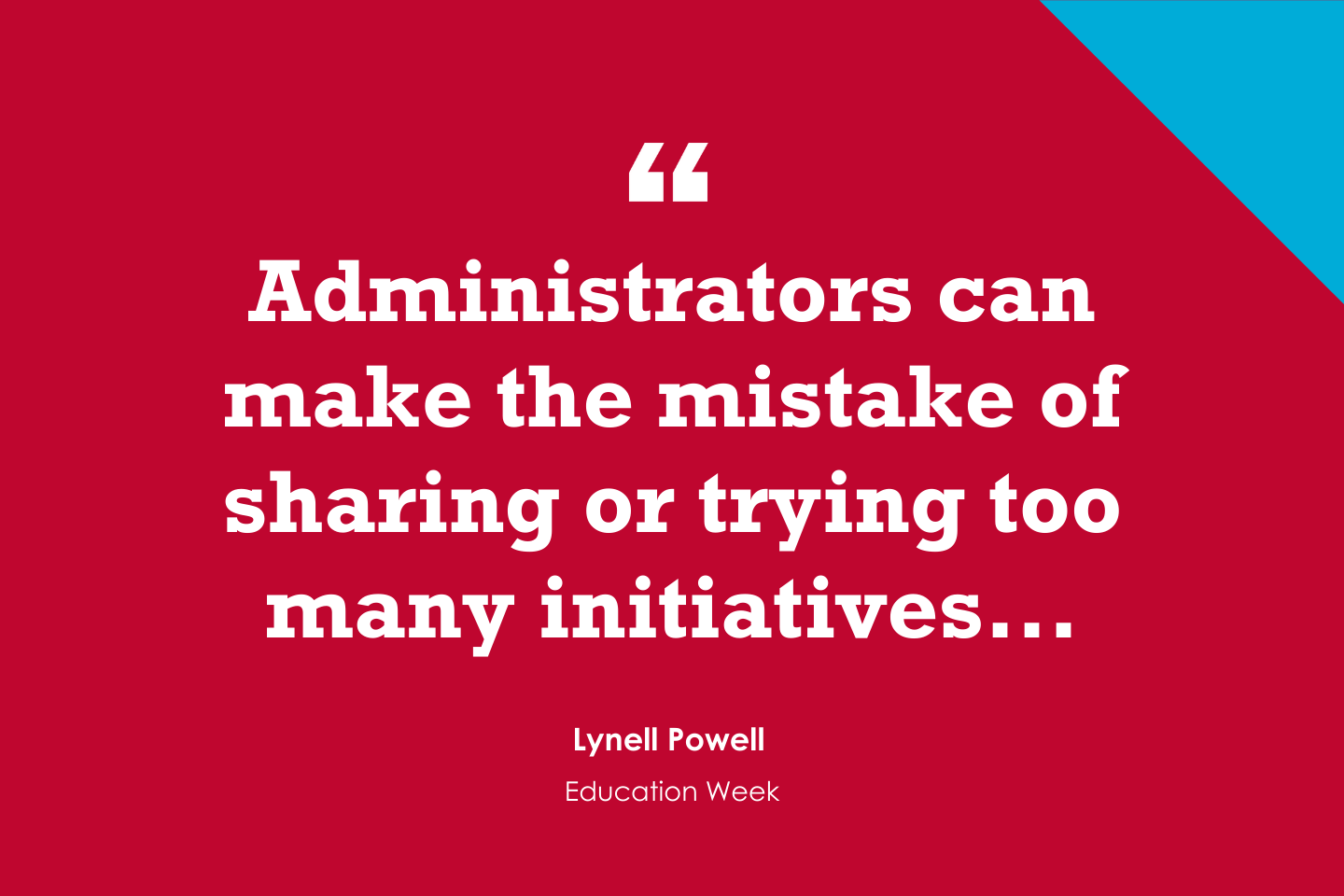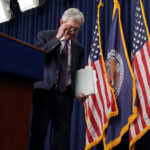
As regular readers know, I’ve been doing the Classroom Q&A column over at Education Week for thirteen years.
And I plan to continue doing it for quite a few more years.
I have so many contributors now, though, that there really isn’t space there for my annual thematic compilation posts, where I collect links to all the posts on particular topics.
So, I’m starting to do it here, instead.
Today’s theme is on Administrator Leadership:
The Single Most Effective Thing Administrators Can Do: Shut Up and Listen
By listening deeply, administrators can create an environment where everyone feels valued, supported, and can challenge assumptions.
Teachers and Students Need Support. 5 Ways Administrators Can Help
In the simplest terms, administrators advise, be present by both listening carefully and being accessible electronically and by phone.
Did Districts Really Do That? Some of Their Worst Decisions
The 5 ‘Best’ Decisions School Districts Have Made
Advice for Principals: Empower Your Teachers
When principals develop partnerships with teachers, it helps them both. Read more.
Principals: Supporting Your Teachers Doesn’t Have to Be Such Hard Work
Principals can show teachers they care by something as simple as a visit to their classrooms or a pat on the back. Read more.
7 Ways Principals Can Support Teachers
Listening more than talking is one vital piece of advice for school leaders to help teachers. Read more.
How to Create a Positive Atmosphere for Teacher Observations
Listening to “understand” instead of “reply” and focusing on teachers’ strengths, not weaknesses, can make the observation more comfortable. Read more.
Throw Out the Protocol for Teacher Observations. Use Common Sense Instead
Narrow the focus when you do a classroom observation, ditch the laptop, and engage with students are a few ideas for improving the practice. Read more.
How to Make Teacher Observations (Almost) Stress-Free
Frequent walk-throughs are one way to reduce anxiety and build trust between teachers and administrators. Read more.
18 Ways to Improve Teacher Observations
Holding pre- and post-conferences, showing more compassion and less judgment, and organizing peer observations are valuable. Read more.
17 Actions Administrators Can Take Now to Support Students & Teachers
The year ahead is going to be “insanely difficult.” Innovation, educator agency, and equity will help leaders bring success to schools. Read more.
‘Listening Is Free’—How Administrators Can Support Teachers This Year
Clearly define and articulate your values and find ways to bring people together are two ways principals and assistant principals can help. Read more.
Four Lessons School Administrators Learned Last Year & Will Apply in the Fall
Four school administrators share lessons learned during the past 18 months of COVID-19 and how they will apply them this fall. Read more.
* A Superintendent’s Thoughts on Reopening Schools in the Fall
With the coronavirus as a backdrop, a district superintendent weighs the pros and cons of different strategies for reopening schools in the fall.
* A Superintendent Explains Why Having to Decide About Fall Reopening Is the ‘Absolute Worst’
District school Superintendent PJ Caposey shares the challenges and questions he is grappling with as he plans for a school year during the pandemic.
* Ways to Handle Student Absences in Remote Teaching & When We’re Back in School
Four educators share advice on dealing with student absences. These include trying to find out the real reasons behind the lack of attendance and building positive teacher/student relationships.
* Responding to Absenteeism During the Coronavirus Pandemic & Beyond
Four educators share strategies for responding to absenteeism—whether from remote learning or from the physical school. They include a reduced emphasis on negative consequences and a renewed focus on relationship-building.
* Administrators Shouldn’t Try ‘Too Many Initiatives’
A five-part series on mistakes made by school administrators is wrapped up today with commentaries from Dr. Lynell Powell, Stuart Ablon, Alisha Pollastri, Diane Mora, and many comments from readers.
* Administrators Can’t Lead From ‘the Confines of Their Office’
Julie Hasson, Ryan Huels, David Bosso, Cindy Terebush, and Kelly Wickham Hurst contribute their thoughts on administrators and the mistakes they make.
* ‘Principals Shouldn’t Be Lonely’
Jen Schwanke, Dr. Jenny Grant Rankin, Harvey Alvy, Michael Haggen, James Erekson, and Michael D. Toth write about their experiences working as, or with, school administrators.
* The Biggest Mistake by Administrators ‘Is Putting Tasks Before People’
Dr. PJ Caposey, Sarah Said, Amy Fast, Andrew Miller, Anthony Kim, and Edward Cosentino share their observations on mistakes administrators make and how to avoid them.
* Common Administrator Mistakes & What to Do Instead
Commentaries from Anne Vilen, Marcy Webb, Dr. Jason Kotch, Roxanna Elden, Baruti Kafele, and Dr. Manuel Rustin “kick off” this five-part series on administrators’ mistakes.
* Central Offices Shouldn’t Be ‘Directive Arms’
Scott Ratchford, Michael Lubelfeld, Jody Spiro, Dr. Jonas Chartock, and Victoria L. Bernhardt comment on the best roles central offices should play in providing school support.
* ‘Authoritarian-Style Mandates’ From Central Offices Don’t Work
Adeyemi Stembridge, Douglas Reeves, Amber Teamann, PJ Caposey, Rachael George, Dr. Patrick Darfler-Sweeney, and Sherry Lanza share their ideas on how school district central offices can best help schools.
* Looking for ‘Solutions’ in the Face of Staff Conflict
Greg Giglio, Jane Kise, David Bateman, Jenifer Cline, Tom Hoerr, and Jennifer Abrams contribute their suggestions for dealing with staff conflict.
* Don’t ‘Ignore’ Staff Conflict in Schools
Sanée Bell, Ed.D., Todd Franklin, Jenny Edwards, Julie P. Combs, Stacey Edmonson, Sandy Harris, and Amber Teamann discuss how to handle workplace conflict at schools.
* Principals Should Realize ‘They Are Still Learners Themselves’
Jen Schwanke, William Sterrett, Amy Dujon, Dr. Raymond Smith, Pete Hall, Sandi Novak, Bonnie Houck, Ed. D., and Daniel Rechtschaffen share their ideas on how principals should do their jobs.
* Principals Should Be ‘Connecting With Kids’
Mike Janatovich, Ann Mausbach, Kim Morrison, Otis Kriegel, Jonathan Eckert, Dr. David Geurin, and Robert Cunard contribute their thoughts on how principals should spend their time.
* Being a Principal Means ‘Spending Time Each Day Building Relationships’
PJ Caposey, Stephanie Brant, Megan Allen, Sanée Bell, and Rachael George share their ideas about how principals should spend their time.
* An ‘Important Challenge for a Principal Is Prioritizing’
Michael Haggen, Donna Wilson, Marcus Conyers, Tom Hoerr, David Bateman, Jenifer Cline, and Jennifer Abrams provide commentaries on the challenges facing principals.
* Challenges Principals Face & How to Respond to Them
Dr. Sanée Bell, Jen Schwanke, Mike Janatovich, Joseph F. Johnson, Jr., Cynthia L. Uline, and Lynne G. Perez share their ideas on challenges facing principals and how best to respond to them.
* Leaders Must ‘Walk the Walk’ and Create a Culture of Innovation
PJ Caposey, Amber Teamann, Matt Renwick, Paul Barnwell, and Mitch Barnes share their ideas on the roles of administrators in making curriculum innovations.
* Support Curriculum Innovations by ‘Failing Forward’
Dr. Sanée Bell, Mark Estrada, Sally J. Zepeda, Adeyemi Stembridge, Kenneth Baum, David Krulwich, and Daniel Venables contribute their suggestions about how administrators can support curriculum innovations.
* Principals ‘Need to Step Back & Forward Through Time’
Myron Dueck, PJ Caposey, Pete Hall, and Christina Post contribute their commentaries on the topic of qualities potential principals should develop and maintain.
* Principals ‘Must Be Reflective Daily About the Work’
Catherine Beck, Mark Estrada, Bill Sterrett, and Ben Fenton share their suggestions about the qualities aspiring principals should cultivate within themselves.
* Ways Principals Can Assist Social Studies Teachers
In this post, Troy Hicks, Kristina J. Doubet, David Sherrin, Kirke Olson, and Barbara Blackburn share their thoughts on how principals can support teachers, specifically in the social sciences. I’ve also included comments from many readers.
* Effective Principals Must ‘Work Collaboratively’
In this post, Shawn Blankenship, Pete Hall, Jennifer Hindman, Steven Anderson, and Aubrie Rojee share their suggestions on how principals can mentor teachers.
* Principals Must Support Teachers in ‘Quest of Continuous Improvement’
This piece features commentaries from Mark Estrada, Diana Laufenberg, Bryan Harris, Ben Spielberg, Sarah Cooper, and Drs. William & Pérsida Himmele on how principals can best support teachers.
* School Leaders Must Focus on ‘Authentic Learning,’ Not ‘Test Prep’
Justin Baeder and Kelly Young (who I consider my mentor in education) contribute their answers here. I include comments from readers, too.
* Administrators Must Make ‘Alliances With Students, Teachers, & Parents’
This post shares guest responses from three educators—Anne Reeves, Justin Tarte, and PJ Caposey.
* Education Innovation Is Like a ‘Stradivarius Violin’
This column shares responses from Maurice J. Elias and Elise Foster, plus comments from readers.
* ‘Educators Are Suffering From Innovation Fatigue’
This post includes commentaries by Scott McLeod, Sally Zepeda, and Tony Frontier.
* Advice for Aspiring Principals: ‘Shadow, Connect, & Dream’
Scott McLeod, Kelly Young, John Gabriel, and Paul Farmer all offer their advice here.
* So, You Want to Be a Principal?
Justin Baeder, Allan R. Bonilla, and Josh Stumpenhorst share their reflections.
* Advice for Educators Wanting to Be Principals—Part One
Lyn Hilt, Joe Mazza, and Cheryl James-Ward contribute to this post.
* We Need ‘Fewer John Waynes & More John Deweys’
This is Part One in a series responding to the question: “How can teachers best relate to superintendents—and vice versa?”
This post provides responses from a teacher’s perspective, with contributions from Randi Weingarten, president of the American Federation of Teachers; Dean Vogel, president of the California Teachers Association; and Barnett Berry of the Center for Teaching Quality.
* Teachers & Superintendents Must ‘Work to Understand Each Other’
This is Part Two, which provides responses from a superintendent’s perspective, with contributions from three superintendents (along with comments from readers): Joshua Starr, Pamela Moran, and John Kuhn.
As regular readers know, I’ve been doing the Classroom Q&A column over at Education Week for thirteen years. And I plan to continue doing it for quite a few more years. I have so many contributors now, though, that there really isn’t space there for my annual thematic compilation posts, where I collect links Ed Week Teacher Larry Ferlazzo’s Websites of the Day…





